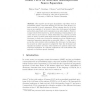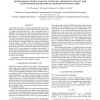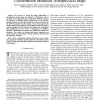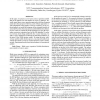309
click to vote
ICA
2012
Springer
13 years 9 months ago
2012
Springer
Non-negative spectrogram factorization algorithms such as probabilistic latent component analysis (PLCA) have been shown to be quite powerful for source separation. When training d...
131
click to vote
ICASSP
2011
IEEE
14 years 5 months ago
2011
IEEE
The problem of audio source separation from a monophonic sound mixture having known instrument types but unknown timbres is presented. An improvement to the Probabilistic Latent C...
132
click to vote
ICASSP
2011
IEEE
14 years 5 months ago
2011
IEEE
We describe and evaluate our toolkit openBliSSART (open-source Blind Source Separation for Audio Recognition Tasks), which is the C++ framework and toolbox that we have successful...
114
Voted
TIP
2010
14 years 8 months ago
2010
We propose to model the image differentials of astrophysical source maps by Student's t-distribution and to use them in the Bayesian source separation method as priors. We int...
122
click to vote
TASLP
2010
14 years 8 months ago
2010
In this paper, the issue of audio source separation from a single channel is addressed, i.e. the estimation of several source signals from a single observation of their mixture. Th...
154
click to vote
ICASSP
2009
IEEE
14 years 11 months ago
2009
IEEE
In this paper, we propose a novel sparse source separation method that can be applied even if the number of sources is unknown. Recently, many sparse source separation approaches ...
129
click to vote
ICASSP
2010
IEEE
15 years 16 hour ago
2010
IEEE
In this paper, we propose a new method of blind source separation (BSS) for music signals. Our method has the following characteristics: 1) the method is a combination of the spar...
131
Voted
TASLP
2010
15 years 12 days ago
2010
— Extracting the main melody from a polyphonic music recording seems natural even to untrained human listeners. To a certain extent it is related to the concept of source separat...
115
click to vote
TASLP
2010
15 years 12 days ago
2010
Abstract—This paper describes a system, referred to as modelbased expectation-maximization source separation and localization (MESSL), for separating and localizing multiple soun...
ICRA
2010
IEEE
15 years 16 days ago
2010
IEEE
— This paper describes improvement of sound source separation for a simultaneous automatic speech recognition (ASR) system of a humanoid robot. A recognition error in the system ...




